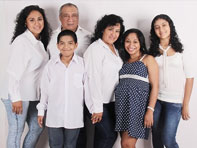860 236-9350 / Text 860 977-0660
690 Flatbush Avenue, West Hartford, CT 06110-1308
Text 860 977-0660
860 236-9350 / Text 860 977-0660
690 Flatbush Avenue, West Hartford, CT 06110-1308
Text 860 977-0660
Nuestros servicios ubicado en Hartford, Connecticut, de inmigración en Serrano Law Firm ayudan a los ciudadanos y residentes legales de los Estados Unidos a unir a sus familias obteniendo la residencia legal (tarjetas verdes) para sus cónyuges (inmigración por matrimonio), hijos y padres. Presentamos solicitudes de exención para aquellos a quienes se les ha negado la residencia legal debido a presencia ilegal o acusaciones de fraude. Ayudamos a los residentes legales a obtener la ciudadanía de los Estados Unidos a través del proceso de naturalización de inmigración. Brindamos ayuda de inmigración a miembros del clero y otros trabajadores religiosos que buscan obtener una visa o residencia legal. Si desea convertirse en ciudadano estadounidense, presentar una solicitud para que un inmigrante sea legal u obtener una visa de prometida o prometido, llámenos al 860 236-9350.

Un ciudadano de los Estados Unidos puede solicitar la residencia legal para más diferentes miembros de familia que un residente permanente legal de los Estados Unidos. Un ciudadano estadounidense también puede solicitar una visa K-1 para un prometido o prometida que vive en el extranjero; el matrimonio debe tener lugar dentro de los 90 días posteriores a la llegada a los Estados Unidos. Las parejas del mismo sexo (homosexuales y lesbianas) pueden usar una visa K-1 para obtener la residencia legal permanente para la persona en el extranjero.
Los cónyuges e hijos de ciudadanos estadounidenses que se encuentran aquí ilegalmente pueden solicitar una exención para acortar el tiempo de espera en el extranjero antes de regresar a los Estados Unidos con una tarjeta verde. Si se aprueba, este proceso de adjudicación de la I-601 en los Estados Unidos permite que ciertos familiares inmediatos de ciudadanos estadounidenses soliciten exenciones de inmigración provisionales antes de salir de los Estados Unidos para el procesamiento consular de sus solicitudes de visa de inmigrante.
Las siguientes secciones explican las leyes de inmigración de familia de los Estados Unidos.
Residencia inmediata (tarjeta verde) para algunos. Si es ciudadano estadounidense, la persona por la que presentó la petición de residencia (tarjeta verde) puede ajustar el estado y convertirse en residente legal sin salir del país si estas ambas cosas son verdades:
Después de que se aprueben los formularios de inmigración y la petición, el pariente inmigrante debe esperar hasta que esté disponible un número de visa de inmigrante. La rapidez con la que esto sucede depende de si fue un ciudadano o un residente legal (titular de una tarjeta verde) de los Estados Unidos quien presentó la petición de inmigración, cómo la persona que la presentó está relacionada con el inmigrante y el país de origen del inmigrante.
La ley de inmigración de los Estados Unidos utiliza las siguientes categorías de preferencias (cuanto más alta es la preferencia, más corta es la espera para una visa de inmigración a los Estados Unidos.):
El tiempo que deben esperar las personas en cada preferencia de inmigración depende de su país. La gente de países donde un gran número está intentando emigrar a los Estados Unidos, como China, India, México y Filipinas, esperará mucho más tiempo que la gente de otros países. La información sobre la disponibilidad de visas de inmigración, incluida la inmigración por matrimonio, se puede encontrar en la página del sitio web del Boletín de Visas del Departamento de Estado de los Estados Unidos (Visa Bulletin).

 El caso de la Corte Suprema de los Estados Unidos, Obergefell v.Hodges, decidido en junio de 2015, hace posible que las parejas homosexuales y lesbianas del mismo sexo utilicen las leyes de inmigración de petición de matrimonio para que un ciudadano estadounidense o residente legal estadounidense obtiene estado de residencia legal permanente (tarjeta verde) para su pareja inmigrante.
El caso de la Corte Suprema de los Estados Unidos, Obergefell v.Hodges, decidido en junio de 2015, hace posible que las parejas homosexuales y lesbianas del mismo sexo utilicen las leyes de inmigración de petición de matrimonio para que un ciudadano estadounidense o residente legal estadounidense obtiene estado de residencia legal permanente (tarjeta verde) para su pareja inmigrante.
Nuestra oficina legal de inmigración de West Hartford atiende a clientes en todo Connecticut, incluyendo
Hartford, Bridgeport, New Haven, Waterbury, Danbury, New Britain, Meriden, Bristol, Manchester, Middletown and Norwich